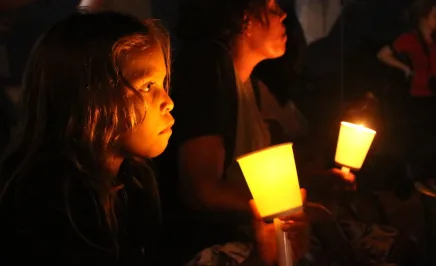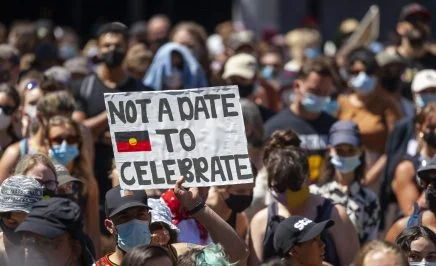On 15 March 2023, the Attorney-General referred an inquiry into Australia’s Human Rights Framework to the Parliamentary Joint Committee on Human Rights. As part of the inquiry, the Committee is asking for written submissions on whether the Australian Parliament should legislate a federal Human Rights Act, and if so, what it should include.
At this moment, it is important to show the Committee that there are people all over Australia who want the government to legislate a Human Rights Act. You don’t need to be a policy expert or a PHD to write a submission, anyone can write a submission for the inquiry. Submissions only need to be 1 or 2 pages long, and should only take 1 or 2 hours to write. And everything you need to write them is below.
Over the next two months, we need as many people as possible writing submissions. The objective is to show the Committee that there is support for a Human Rights Act from people all around Australia.
The Committee will produce a report with recommendations for the government, and this will include whether to legislate a Human Rights Act or not. We want the Committee to recommend that the government legislates a Human Rights Act, so all our rights are finally protected in law.
*** NEW RESOURCE ***
Watch this 20 minute video to find out all about how to write a submission.
Our campaigner, Nikita White, explains where we are at with our Human Rights Act campaign, why we need to write submissions, how to write a submission, and answers a few key questions.
Steps to writing your submission
- We have prepared a template submission you can use to write your submission. Download the template submission.
- Personalise the parts in red. You can write the submission as an individual or as a community. It’s important that you make the submission personal. The Committee wants to know why you or your community want a Human Rights Act, in your own words.
- Make sure you proofread it, or get someone to proofread it, before you send it off. You must include a name, postal or email address, and contact number of the someone making the submission.
- Submissions are published on the Parliament House website. If you want your name to be withheld when the submission is published, there is a space in the template to note this.
- Once your submission is done, you can email it to human.rights@aph.gov.au before 1 July 2023. We have prepared a template email. It is best to send the submission itself as a PDF attachment.
- Share this with anyone else who you think should share their thoughts, and work with them on writing a submission. They could be people you know who also advocate for human rights, and people who have experienced human rights abuses. They may have had trouble accessing healthcare, including mental health care, received a robot debt, or their loved one may have experienced abuses in aged care. It is important for the Parliamentary committee members to hear from diverse voices and constituencies, so reach out to anyone you know who cares about human rights.
- Share this with anyone else who you think should share their thoughts, and work with them on writing a submission.
Resources
Other useful links:
- Human Rights Commission’s report, and position paper on a Human Rights Act
- Human Rights Charter Coalition’s 101 cases website
- Amnesty’s Human Rights Act campaign page
A federal Human Rights Act for Australia
A Human Rights Act would protect the rights of all people in Australia, all the time. A federal Act would mean federal government authorities have to consider human rights when drafting laws, making decisions on policy, delivering services, which would help prevent human rights abuses.
Importantly, it would mean people could take action if their rights were abused, whether making a complaint to the Human Rights Commission, or raising a matter in court. Finally, a Human Rights Act will foster respect for human rights in Australia, so we can work toward a future where everyone, everywhere understands their rights, and the rights of others.
How would potential legislation look? What exactly is Amnesty asking for?
Amnesty is advocating for a legislative Act based on those in Victoria, ACT and Queensland, and in the United Kingdom and New Zealand. We are not calling for a Constitutional model, but a law passed by the federal Parliament. This model would retain parliamentary supremacy but also have a strong focus on preventing human rights violations by requiring federal authorities to consider human rights when making decisions.
We’re calling for an act that protects all rights Australia has signed up to when we have ratified international human rights treaties. It is important that the Act is enforceable, so that people can challenge human rights abuses. A federal Act would govern the activities of federal government authorities, and we are calling for this to include those organisations doing work for the Federal government on an outsourced basis.
For more information, read the Human Rights Commission’s position paper on a federal Human Rights Act.
The inquiry, and the Parliamentary Joint Committee on Human Rights
What is the Parliamentary Joint Committee on Human Rights?
The Committee has members from the House of Representatives and the Senate, and from different political parties Labor Party, the Coalition, and independents.
Parliamentary committees investigate specific matters of policy or government administration or performance. They provide an opportunity for organisations and individuals to participate in policy making and to have their views placed on the public record and considered as part of the decision-making process.
What is the scope of the inquiry or the terms of reference?
The inquiry is considering the scope and effectiveness of Australia’s 2010 Human Rights Framework and the National Human Rights Action Plan; including
- whether the Framework should be re-established, as well as the components of the Framework, and any improvements that should be made;
- developments since 2010 in Australian human rights laws (both at the Commonwealth and State and Territory levels) and relevant case law; and
- to consider any other relevant matters.
However, there is no obligation to address all the terms of reference in your submission, and it is common to only address certain matters within an inquiries’ scope in a submission.
What happens with my submission?
Submissions are published on the Parliament House website, so only include information you would be happy to see published on the internet. You can ask for your name to be withheld from the submission, or for your submission to be kept private. It may take several weeks to publish your submission. You can share your submission publicly after the parliamentary committee has published it on their website.
What comes next?
The committee will decide whether to accept your submission and whether to publish it. That is the conclusion of the first stage.
The second stage includes public hearings where the Committee members hear from people, and ask questions. Hearings can take place in Canberra and around the country. Some hearings are also done online. If you write a submission you could be invited to speak at a hearing.
The Committee will issue a report on the inquiry in March 2024 with recommendations for the government.The Committee could recommend the government legislate a Human Rights Act. The Committee may also refer to your submission in its report. The government will then decide whether to accept, partially accept, or reject, the report’s recommendations.
Our campaign will then be focused on ensuring that the government legislates a Human Rights Act (if the Committee recommends this, and the government accepts this recommendation). If the Committee doesn’t recommend legislating a Human Rights Act, or the government doesn’t accept a recommendation to legislate a Human Rights Act, we will continue to make our case for protecting people’s rights in law.
If you have any questions, you can reach out to aira.firdaus@amnesty.org.au or nikita.white@amnesty.org.au .








